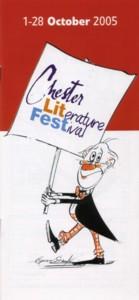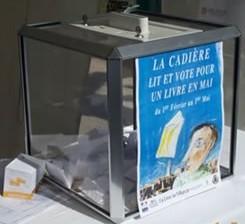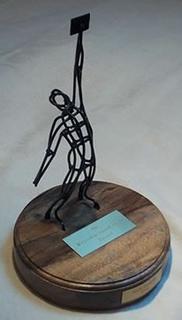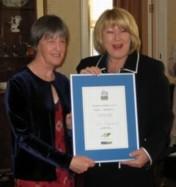
Freda Hadwen has been the organiser of the Chester Literature Festival for the last ten years, and she kindly agreed to answer a few questions about her work as organiser of the festival but we began with a few general questions:
About snails...
CD: Do you have any memorable encounters with snails?
FH: I dislike snails intensely, they eat my plants and so I obliterate them from my patch, either by throwing them onto someone else’s garden or 'doing' for them with various preparations.
CD: Not a snail lover then. How about slugs?
FH: Slugs almost fall into the same category because they perform the same act on my plants.
About life...
CD: What is your proudest moment?
FH: Becoming a mother - that’s meant a lot to me throughout my life and now being a grandmother, that’s been an absolute delight.
CD: Have you ever had a life-changing event?
FH: Going to live abroad for 10 years in the middle-east, with all the experiences that entailed. The person that went out didn’t return. For the first time I was able to live a life for myself after a period of having to work to educate my two clever daughters. I could read books without feeling guilty, played sport, which I adore, as well as living in a multiracial society which I found very exciting as I learnt a lot. I also met some very strange people...
CD: How were they strange?
FH: They had lived nomadic lives - from when they had left university they had spent their lives travelling and they were lovely, interesting, open people. We lived just three days from where Saddam Hussein was bombing and one of my friends hid in a roof in Kuwait during one of the raids and was not discovered. The country itself interested me - the Sultan of Oman was deposed by his son - this son was educated in the UK and during his rule changed Oman from something biblical - girls were not educated at all in 1960, and boys, educated at Koranaic schools, had to leave the country if they wished to continue their education - to a modern state. I found this fascinating and read extensively about the country.

CD: What is the saddest thing you’ve ever seen or heard?
FH: In Birkenhead Market I once saw a very old woman, clean, you know, but she was trying to sell these two or three sprigs of mint that she’d taken from a garden. So I just gave her some money and asked her to promise me that she’d buy herself a dinner.
CD: If there was one thing you could change about yourself what would it be?
FH: That I had continued with my education - I always made sure that my two girls knew how important it is to be equipped for life, to be able to stand on their own two feet. It is always necessary for a woman to have the means to earn a living.
CD: If you had continued your education - what subject would it have been in?
FH: English I think.
CD: What is happiness?
FH: Happiness for me?
CD: For anybody.
FH: I learnt from my own experience that a background of encouragement was really important for a child - so I always encouraged my children in what they wanted to do. So I suppose happiness for me is seeing that they’ve turned out well and capable and that they are good people...and that’s another thing too - getting on well with my fellow human beings that's important for my happiness too.
CD: What is the first thing you do when you get up?
FH: I always get up well before my husband. I like the peace and quiet of the first part of the day. So I get up and I make myself a cup of tea from a special pot and have my breakfast and look after the cat who has walked in on me - I used to have a Persian who treated me like dirt, but this one just walked in on me - I think he’d been dumped.

About Chester Literature Festival...
CD: Who runs the Chester Literature Festival?
FH: The committee of nine people - two from the bookshops (Waterstones and Bookland) and the rest from interested parties e.g. representatives from the Friends of the Chester Literature Festival, Chester Poets and Chester Writers - and there are subcommittees too which meet when I need them to meet.
CD: How often do you meet?
FH: Once a month or as required.
CD: How does your work vary throughout the year? Starting say from the end of the festival in October?
FH: November I’d start with bills (in conjunction with the treasurer) and write thank you letters to numerous people involved with the programming. Then I deal with the events that were proposed too late to be used but are interesting enough to be considered for next year's. Some are an immediate ‘Yes’ but others need to be debated by committee. I get a massive amount of enquiries. I have to tell some of them to come back to me mid-February or mid-January, and then we’ll talk, and then the programme committee goes through them. A lot of this has to be filed.
Then there are catalogues from the publishers - they’re very good about sending these - and I trawl through these, thinking yes, yes...putting my yellow stickers in, then I get in touch with David - the manager of Bookland (an independent bookshop) and he goes to these book fairs...
CD: Frankfurt?
FH: No London, and some others (in this country), I don’t think we’d run to Frankfurt. He rings me with tips on what he's seen and I chase his recommendations immediately. Then I look in the newspapers and listen to book programmes and all that sort of thing - I try to listen to as many as possible to see what’s going on there, and I also keep last year's catalogues because then you've got the paperbacks, and some of those you might be able to get on as well...So I do the complete programme...and well, it is a year’s work.

CD: So the compilation of the programme starts mid January...
FH: Yes, and goes on continually really until July. An important part of the job is reassurance - reassuring the publicists that things will run smoothly,that their authors will be comfortably accommodated. It is part of the publicists’ job to ensure that during the author’s two weeks of publicity there is a neat journey of events e.g. the author could be with us at lunchtime for an event and then go down to Cheltenham for the evening because our festivals run at the same time.
One of the frustrations involved is getting a ‘yes’ - the whole thing is a bit of a lottery and you have to make sure your head is above the surface. It is one fo the biggest growing industries...
CD: Is it?
FH: Oh yes, really big business.
CD: So we’re through to July. The programme has been finalised between May and June?
FH: Yes.
CD: Then in July it goes off to the printers and then in August it's back from the printers?
FH: Yes.
CD: And in the meantime you’re finalising things?
FH: And getting things ready. Getting the envelopes all ready, with the address labels - it’s like a production line...and then I let the TIC know...
CD: TIC?
FH: Tourist Information Centre. They start to get asked by customers.
CD: Do many people from overseas come then?
FH: Yes, and people home on leave, and people from other parts of the UK who love coming to things like this.
CD: Do you think the Liverpool as European City of Culture in 2008 is going to have an impact?
FH: Yes, if it is handled properly it should be of benefit. There should be a lot of interest.
CD: So we’ve worked through virtually the entire year now, just missing out the most important part - the actual festival itself and the time just before. presumably that is the time of your heaviest work load?
FH: Yes, in late August I’m just getting all my show cards organised, and then I’ll be liaising with the Gateway Theatre about seating, and then there is my big job - my head list. I take each event apart and note what is required - then take it to the committee for them to sign on the line what they are going to do - who is going to meet the authors, introduce them, give the vote of thanks, who is going to be on duty, do we need a float, will there be drinks - looking after all aspect of the events.
CD: Then in October ...?
FH: I go to a lot of the events - I went to 28 events last year. I also have to do the refreshments which can sometimes be a problem, as some authors have quite specific requirements - so I have to liaise with catering firms.

CD: What is the most rewarding aspect of your job?
FH: Without doubt seeing people having a wonderful evening. I know that without an organisation like this Chester would not have the opportunity to see these people, and Chester would be a sadder place as a consequence.
CD: Who was your favourite guest?
FH: Benjamin Zephaniah. He’s a vegan so I had to provide a special meal from caterers, and they did a wonderful job...and Benjamin, he couldn’t eat it all, so he took it home with him, then thanked me later. Lovely man, really intelligent. Another favourite with everyone was Martin Jarvis, he was quite delightful and very appreciative. Also liked Mike Nicholl - the tornado pilot who was tortured in Iraq - a great favourite with the ladies at the Grosvenor Hotel.
CD: Have you ever had any embarrassing moments?
FH: No, to be honest, I can’t think of any, so far, fingers crossed.
CD: Is there anything you would like to change?
FH: I think it would be a good idea to hold a spring festival as well, and to have double the events so people have a choice, have it more concentrated.
CD: What is the point of literary festivals?
FH: I think they have two purposes - one to educate while you enjoy (and that is for as wide a spectrum as possible) and the other is for fun. I think it is important that events should include as many people as possible.
CD: And my final question - what would you say are the ideal qualities someone needs to do your job?
FH: Tenacity, to keep chasing things, and follow them through; to have a good telephone manner; be good at making local links with the community and keeping these going; to have the ability to generally get on with people; to be approachable, but at the same time give the person you’re talking to the impression that you are in command.
Since Freda has taken over the running of the festival the programme has gone from strength to strength. Successfully maintaining a festival like Chester's must be a huge amount of work, and Freda has obviously built up a valuable network over the years. However the forthcoming festival in October will be her last - she is planning to leave in order to pursue her many other interests including looking after her new granddaughter. I know that she will be very much missed.






























